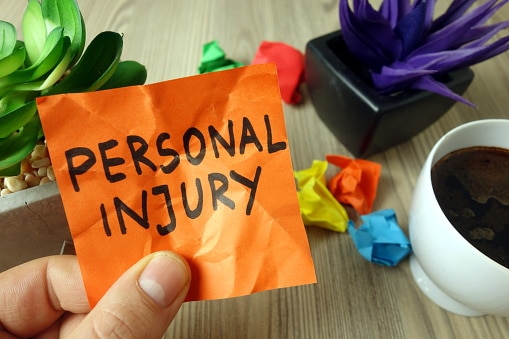
Table of Contents
What to expect during a personal injury claim?
Compensation claims can be a complicated legal process, but you don’t need to worry about that as long as your lawyer has some guidance. We’ll take you through every step of the way in simple terms so there’s no confusion on what they will do for their client!

What’s the time limit for making a claim?
The time limit for filing a personal injury claim is three years. If you were injured or became aware of your injuries more than three years ago.
it’s possible to file suit without having lost all capacity in the event where full recovery has not yet occurred; however there are some exceptions including children who count as ‘triers age 17 and under. which means their limits extend from 18th birthday onwards with no maximum amount allowed by law.
In addition if someone cannot clearly remember what happened due mental frailty at point when they should have been able recall events accurately then lawyer may advise waiting before going ahead with proceedings since this person could lack awareness over how long such amnesia lasts following initial onset.”
The Claims Portal will handle your claim as quickly and cost-efficiently as possible.
The Pre-Action Protocol of personal injury claim
If you want to make a claim for £25,000 or less without going through court proceedings then your solicitor should use the Pre-Action Protocol. This is an agreed set of protocols which help claimants prepare their cases and avoid costly legal fees in determining responsibility before any evidence has been gathered by either side as part of litigation.
Outside of the Protocol are some claims, such as high-value personal injury claims or road traffic accident injury claims in which you were partly at fault. If this is the case for you, your solicitor will be able to guide you through your choices.
Notification of personal injury Claim
When you speak to your solicitor, they’ll ask you some questions so that they have all the relevant details of what caused these injuries. They then send a Claim Notification Form which is sent via registered post or courier if it’s an emergency situation like medical care needed for life-threatening injury.
Because there are no other options available at this moment in time before actually sending out any paperwork related claims against people who might be responsible – but don’t worry! You can also request e-notices instead where everything gets done digitally on their end too without having Signature Verification Required documentation showing up after filing suit through mail delivery services.
The Claim Notification Form is used to notify the other side of your claim, and they must respond within 24 hours.
Letter of Claim for personal injury claim
After the Notification of Claim, your lawyer will send a comprehensive Letter of Claim to the defendant.
In the event of an injury, you need to be as forthcoming and honest with your attorney as possible. Include any details that may help them in their defense or recovery from damages sustained because of this unfortunate circumstance!
If you submit an injury-related claim to your insurance company, they should send you a response within 21 days. They then have three more months to examine the claim. They’ll either accept responsibility for your injuries or refute them afterward.
The Defendant’s Preliminary Response
If the defendant responds to your Letter of Claim, they will admit liability or responsibility. If this happens and you have suffered damage as well, then negotiate with them before taking it further for 21 days so that both parties can reach an agreement on how much compensation is due from them in return for their admission- which could lead up towards gaining monetary damages!
However, if the defendant refuses to admit liability then they have an obligation under law and must give their own detailed version of what happened. For example: An employer might argue that since risk assessments were carried out thoroughly enough for them not be held accountable in these proceedings therefore you are also being demanding too much from this party by claiming negligence on behalf of another individual or company who had no part whatsoever with your injuries .
If the wrongdoer fails to respond in any manner to the Letter of Claim, you can proceed with formal litigation..
Investigation Stage
If the defendant does not admit or deny responsibility, they have three months from your first response to investigate. If this period ends without an answer please let me know so that I can help!
If the defendant refuses to accept responsibility, they must give a thorough explanation. This aids both parties in identifying and resolving the issues that remain unresolved.
Rehabilitation Needs
Your solicitor and the negligent party should consider whether you have a genuine and reasonable need for rehabilitation treatment as soon as possible and throughout your claim.
If your injuries meet the Rehabilitation Code’s criteria, you must follow it. If rehabilitation is relevant to your case, your solicitor will explain the circumstances to you.
Expert Medical Report
If you are looking to file a personal injury claim, then it is likely that the first step will involve seeing an expert medical specialist. This person can document their findings and provide support for your case by filling out forms or giving testimony at trial if needed.
You may need more than one medical expert to help diagnose and treat your injuries. For example, if you break your back an ortho predict specialist would be needed; while someone with a head injury needs neurosurgery or neurology consultation as well.
Your lawyer will arrange for your medical examination and select a day and time that is convenient for you.
You should always read and understand the terms of any agreement before signing. The medical notes and records you provide during an examination may be passed on to a third party for review, so it is important that everything from what we discuss today onward remains confidential between us as well as those receiving these documents later down the line.”
At the appointment, you’ll answer some questions about your injuries and have them examined by a professional who specializes in these types of cases. The expert will give an opinion based on what she has seen that may or may not be related to work duties.
As well as severity over time should any further action need to take place regarding treatment options for those particular conditions because there are always other ways we could go at trying something new if all else fails so keep yourself informed!
Witness Statements
If you have been involved in an accident and need to make a claim for damages, don’t forget that your witness statement will be important. Witnesses can help with the process of settling claims against other parties as well as providing evidence which could strengthen any lawsuits filed on their behalf!
Negotiating a Settlement
If the other party accepts responsibility for your injury, then their solicitors will send any medical records and photographs. They’ll also provide a report from an expert doctor who has been examining you as well as statements from witnesses about what happened that led up to it all happening in order help with mounting reasonable compensation claims against them if necessary!
Your solicitor will use their skills to negotiate on your behalf so that you can receive all the compensation owed. They’ll consult closely with how much pain and suffering was incurred, while also considering financial losses of any kind sustained during this process.
Settling a personal injury claim is usually the case, but if a settlement cannot be reached, it may be necessary to file formal court action. If this happens, your attorney will assist you throughout the procedure.
When your lawyer makes an offer to settle, the opposing side is given 15 days to accept it – or make their own counteroffer.
Negotiations are a great way to resolve an argument. If one side wants something more, they can always propose an increase in compensation and work towards reaching the best possible solution without ever having any negative feelings get between them!
Negotiation is beneficial because it helps both parties come up with solutions that fit their needs while also being fair enough so no party feels slighted or taken advantage of – especially when compared against what might have happened otherwise where someone was just going off blindly on how much he/she deserves.



